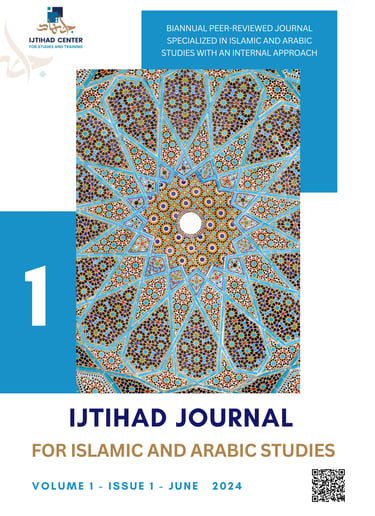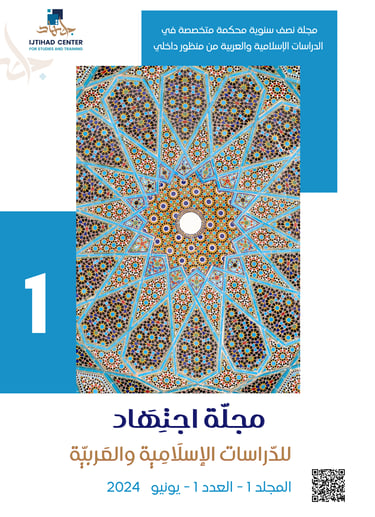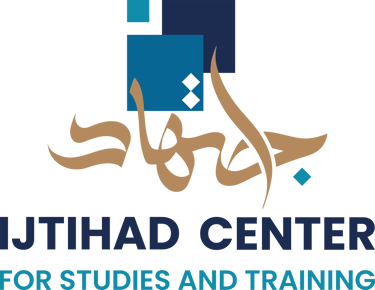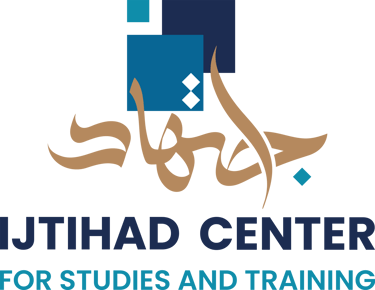“Ijtihad Journal for Islamic and Arabic Studies” (IJIAS) is issued by the Ijtihad Center for Studies and Training in Belgium, and is registered in the Royal Belgian Library (KBR) and the National Scientific Library, under the serial number: ISSN: 2983-9939 and ISSNe: 3041-4679. The journal is biannual and peer-reviewed according to international academic standards. The journal is biannual, peer-reviewed in accordance with international academic standards, and focuses on Islamic and Arabic studies in Europe and the West, and religious studies, interfaith dialogue, comparative religion science, the jurisprudence of minorities, and the image of Islam in the West. The Ijtihad Journal is overseen by a distinguished team of researchers, experts, and scholars from various universities and research centers, representing a wide range of academic interests.
The Arabic and Muslim population group has become a significant component of contemporary pluralistic Western and European societies, whether on the demographic, institutional or cultural level. The demand for various intellectual, educational, linguistic, and economic products has expanded among Muslims in the face of limited opportunities that do not meet the existing needs. Or rather, there is an offer, but it does not suit the requirements and needs of Muslims. This also applies to the field of knowledge, which requires further evaluation, qualification, and diligence to keep pace with the new civilizational conditions in Europe and the West. The presence of Islam in the West brings about important transformations from the context of immigration to the context of citizenship, from the problematic phase to the contributory phase, and from the passive presence to the active engagement.
When we evaluate the reality of Muslims in Europe, nearly half a century after the start of labor migration in the 1960s, we find that they have been able to achieve a significant number of educational, institutional, legal and political gains. Thus, Muslims in general, and the last Muslim generations in particular, began to participate and contribute to education, scientific research, civil society, political work, media, and many other areas. The element of original Islamic identity has not been absent in the midst of these transformations dictated by the new secular and pluralistic context in which Muslims live. Rather, identity has always remained present, whether in the media, political discussions, or in educational, academic, and research institutions.
For many centuries, Islam has been confined to Orientalist theories that study its various theological, jurisprudential, ethical, and linguistic topics from outside the Islamic cognitive and methodological reference. This Orientalist preoccupation has led to the establishment of what is known as the fields of Arabic Studies, Islamology, Islamic Theology, and Qur’anic Studies. These are specializations that are hardly devoid of faculties of arts, languages, and theology in different European and Western universities. This has enriched Islamic and Arabic studies at the level of academic programs, specialized conferences, research publications, and peer-reviewed scientific journals. Thus, each college or department of religious or linguistic studies became unique and famous for its special trainings or programs in Arabic and Islamic studies. Some universities were known for holding international scientific seminars specializing in some issues of Islam and the Arabic language, while some academic centers published peer-reviewed monographs and journals dedicated to Arabic and Islamic studies.
Regarding peer-reviewed scientific journals that specialize in Islamic and Arabic studies in Europe and the West, we have noted five critical observations, which are as follows:
Most of these journals are published by European and Western non-Islamic universities and research centers, and they take Islam and Arabic language as their primary research subject.
In their approach to Islam, in most cases, these journals are based on external “Orientalist” and critical principles, and they require researchers, Muslims and non-Muslims, to submit to the objective and methodological standards they adopt.
These journals study Islam and Arabic culture from an outside perspective without giving much importance to the inside approach, whether traditional or contemporary, adopted by researchers with Islamic doctrinal background.
There are some journals that not only set strict methodological standards, but also subject research to their own evaluation system, which is not devoid of ideological and Orientalist interpretations that do not accept Islamic theological, jurisprudential, and moral postulates.
There is a new trend in many international peer-reviewed journals, which is requiring “very high” financial fees from researchers in exchange for publishing their articles. This makes the profit goal dominate academic research at the expense of scientific, educational and methodological goals.
This means that despite the great (and somewhat positive) development that Arabic and Islamic studies have witnessed in Western and European universities and research centers, their academic work on issues of Islam is not devoid of subjective and ideological interpretation despite the claim of neutrality and objectivity. In the midst of this undesirable situation affecting Islamic research in the Western academic world, the idea of establishing a peer-reviewed journal arose. On the one hand, this journal will focus on dealing with Islamic and Arabic topics from within their original reference, while benefiting from the achievements of Western scientific research, especially methodologically, technically and communicatively. On the other hand, this journal will approach Islam and Muslim issues from within the European and Western context. Thus, in this approach, we give space to study Islam from its inside perspective, which is lacking in Arabic and Islamic studies adopted in the West. At the same time, we start from within Europe and the West to approach the Islamic cultural, religious, literary and academic presence there and discuss Western studies that deal with that Islamic presence as well.


Objectives of Ijtihad Journal
Ijtihad Journal is concerned with Islamic and Arabic studies in Europe and the West, whether by approaching various religious, jurisprudential, cultural, educational, social, political and historical issues of Islam and Muslims, or by dealing with different traditional and contemporary Orientalist studies and research on Islam through review, criticism and evaluation. The objectives of the Journal are as follows:
Dealing with the various theological, jurisprudential, ethical, philosophical, social, linguistic and historical issues of Islam with an objective critical methodology starting from within the Islamic reference while benefiting from external Western research achievements, especially methodology, technology and linguistics.
Studying the divers traditional and contemporary Orientalist studies on Islam for the purpose of objective review to correct deviant ones and benefit from their scientific and qualitative results.
Enriching the field of Arabic and Islamic studies in Europe and the West with a different approach that focuses on the internal Islamic perspective and takes the Western intellectual and realistic context into account.
Restoring the objective contribution of Orientalism by dedicating independent studies to Orientalist scholars, thinkers, figures, and schools that made Islam their subject.
Documenting the results of Arabic and Islamic studies in Europe and the West by introducing various Muslim and non-Muslim researchers, research centers, academic institutions, and universities.
Reviewing literature and studies that focused on various religious, historical, intellectual and linguistic topics of Islam, including books, dictionaries, encyclopedias, and seminars.
Launching an introductory and documentary bibliography of the most important works written in the field of Arabic and Islamic studies, in the past and the present, in Europe and the West.
Enabling young researchers to publish their studies and the findings of their university theses in the form of articles, chapters or summaries.
Organizing international scientific seminars, lectures, and methodological and pedagogical trainings, whether by the Ijtihad Center for Studies and Training or in cooperation with research centers and academic institutions in Europe, the West, and the Arabic and Islamic world.
Issuing individual or parallel joint studies by the journal or within the framework of the “Studies of Islam in the West” project.


Why Ijtihad Journal?
General standards
Writing original and innovative research for the journal.
The research should not have been previously published or agreed upon with any other publishing party.
The research can be a translation of another work published in another language, provided that the researcher declares this.
The research should not be derived from a university thesis or dissertation, but rather the results of previous research can be invested in a new article or chapter.
The research submitted for publication does not conflict with the general vision adopted by the Ijtihad Center for Studies and Training and the Ijtihad Journal of Islamic and Arabic Studies.
Researchers should provide qualitative additions that take into account the goals set by the Center and the Journal.
Researchers should provide deep insights inspired by Islamic values of a common universal nature, while being open to positive secular, pluralistic, and modernist values.
Researchers should contribute to formulating an objective approach based on the inside Islamic perspective while benefiting from objective Orientalist studies.
Researchers adhere to the methodological, technical and linguistic standards adopted in academic research.
Researchers write in a clear and authentic academic language (Arabic, English, French, Dutch...).
The possibility of future translation offers valuable research if appropriate financial support is available.
The journal has the right to republish the materials or translate them independently or into a book.
The published materials do not necessarily express the opinion of the journal.
The journal does not grant any financial reward for research due to the lack of financial capabilities.
The journal charges an appropriate financial reward for publication in order to cover the expenses of review, printing and publishing.
The journal grants participating researchers and reviewers some privileges, such as granting free membership, granting a certificate, granting some copies of the work, and nominations to participate in seminars, trainings, and research activities of the Ijtihad Center or of the centers collaborating with them.
Standards for Publication in Ijtihad Journal
Types of Articles
Peer-reviewed articles are subject to the following methodological standards:
Article title (main/sub).
The researcher’s full name and the institution to which he belongs.
A summary of the article (about 300 words) in the language of writing, in addition to Arabic and English.
Five keywords.
A general introduction, which includes the research problem and the purpose of the study, with reference to the most important previous literature related to the subject, and the type of approach adopted.
The content of the article, includes defining concepts, introducing theories, interpretations and visions, and discussing and analyzing the research results in depth.
The article concludes with research conclusions and recommendations.
List of bibliography used in the article.
The length of the article ranges between 7000 and 10000 words.
Each article is subject to the first internal reading by the journal’s editorial board, and if it meets the initial conditions, it is referred to the reviewing commission.
Each article is subject to double-blind peer review.
Peer-reviewed chapters are subject to the following methodological standards:
Chapter title (main/sub).
The researcher’s full name and the institution to which he belongs.
A summary of the chapter (about 300 words) in the language of writing, in addition to Arabic and English.
Five keywords.
A general introduction, which includes the research problem and the aim of dealing with it, with reference to the original work (dissertation, book, monography) from which it was derived, with an explanation of the importance of publishing it in a separate chapter, and the type of approach adopted.
Chapter content, including defining the central concepts, presenting theories, interpretations and visions, discussing the research results and analyzing them in depth.
The chapter concludes with the most important conclusions of the research.
List of bibliographies used in the chapter.
Chapter size ranges between 7000 and 10000 words.
Each chapter is subject to the first internal reading by the magazine’s editorial board, and if it meets the initial conditions, it is referred to the reviewing commission.
Each chapter is subject to double-blind peer review.
In-depth critical reviews are subject to the following methodological standards:
Main review title.
A subtitle that includes the title of the reviewed work and its author.
The researcher’s full name and the institution to which he belongs.
A summary of the review (about 300 words) in the language of writing, in addition to Arabic and English.
Five keywords.
A general introduction, including a brief overview of the author of the work, his most important publications and intellectual and academic works, the reasons for writing this review, the importance of the reviewed work, the research problem for this review, and the nature of the adopted approach.
The content of the review, includes the basic concepts in the work, presenting the author’s theory and vision, discussing the results of the review and analyzing them in depth.
The review concludes with research conclusions and recommendations.
List of bibliography used in the review.
A table of the most important information about the reviewed work: title, author, date of publication, place of publication, publisher, language of the book, etc.
The cover of the reviewed work and a photo of its author.
The length of the review ranges between 5000 and 7000 words.
Each review is subject to the first internal reading by the journal’s editorial board, and if it meets the initial conditions, it is referred to the reviewing commission.
Every critical review is subject to a double-blind peer review.
Introductory reviews are subject to the following methodological standards:
Main review title.
A subtitle that includes the title of the reviewed work and its author.
The researcher’s full name and the institution to which he belongs.
A short introduction, including a brief overview of the author of the work, his most important publications and intellectual and academic works, and the importance of the reviewed work.
The content of the article, in which the reviewer summarizes the most important contents of the work, either in a sequential manner according to the order of the chapters, or in a thematic form in which he presents the most important issues addressed by the author.
A brief conclusion with the researcher’s most important impression after reading the work.
A table of the most important information about the referenced work: title, author, date of publication, place of publication, publisher, language of the work, etc.
The cover of the reviewed work and a photo of its author.
The length of the review ranges between 1500 and 2000 words.
Introductory reviews are subject to internal reading only in order to evaluate them linguistically and methodologically.
Academic interviews are subject to the following methodological standards:
Main interview title.
A subtitle that includes the name of the interviewed person, the title, and the origin.
The interviewed person must be a researcher, expert, or academic specializing in Islamic and Arabic studies or in a field related to it, such as theological and religious studies, interfaith dialogue, comparative religion science, Islam in the West, and others.
The interviewer’s full name and the institution to which he belongs.
A short introduction, including a brief overview of the interviewed person, his/her most important publications and intellectual and academic contribution, the reasons for holding this interview, and its importance for the journal.
Clear, deep, and precise questions, including general questions related to the personality of the interviewed person, his/her interests, and specialty, to bring readers closer to his qualitative contributions and their value to research and society.
The covers of the works of the interviewed person, publications, photographs, quotes, etc.
The length of the interview ranges between 3000 and 5000 words.
Interviews are only subject to internal reading to evaluate them linguistically and methodologically.


